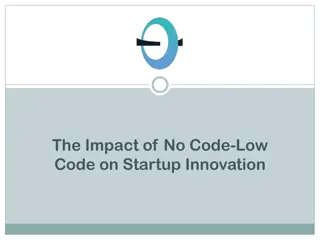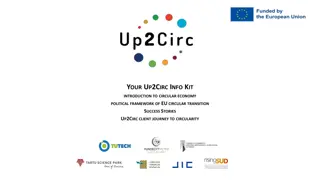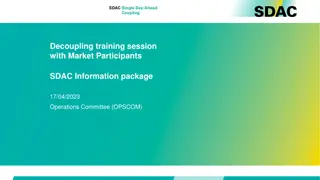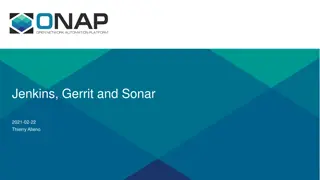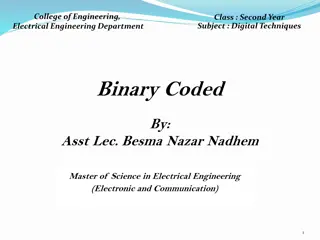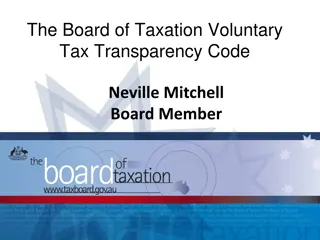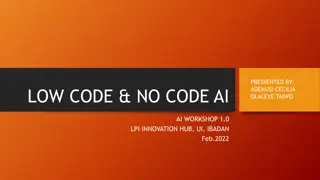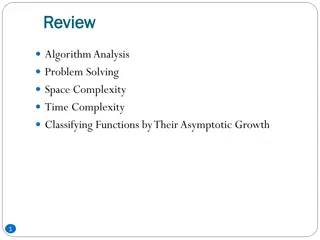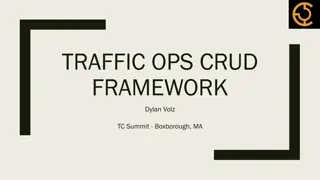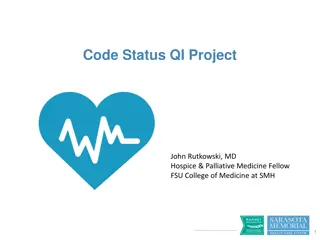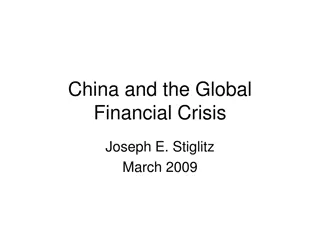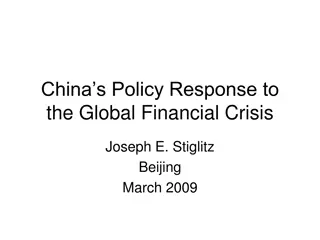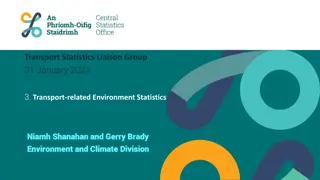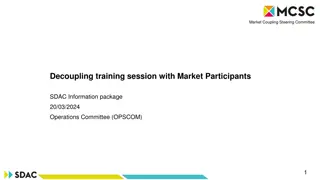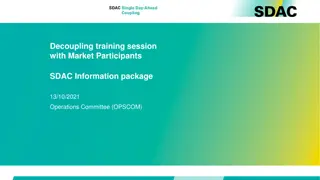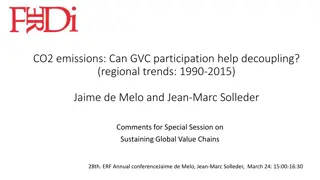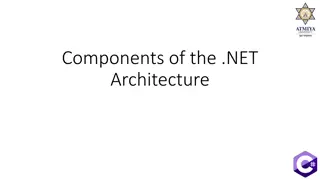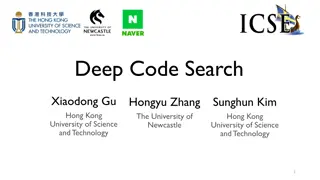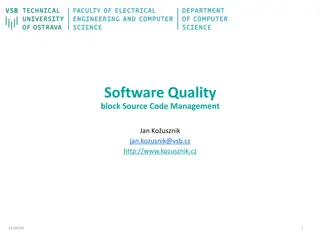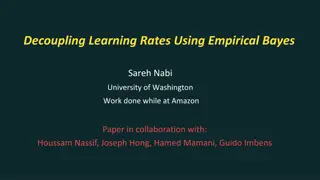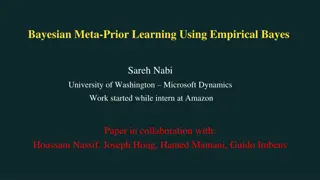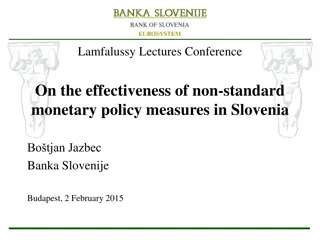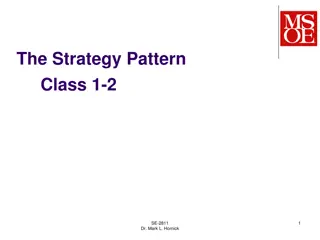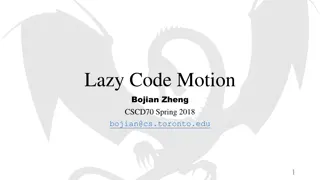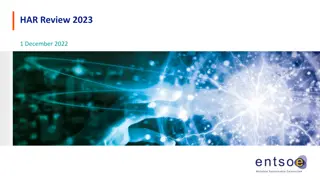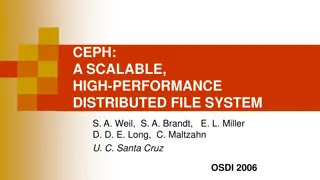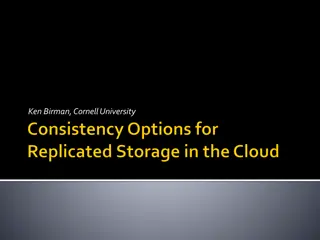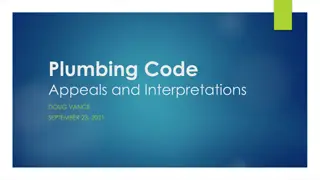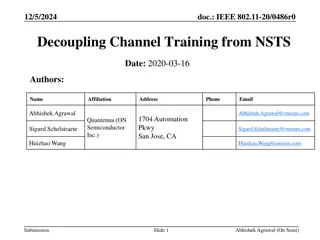The Impact of No Code-Low Code on Startup Innovation
In the vibrant world of startups, innovation is the cornerstone of success. As these businesses aim to carve out their niches, they often face a common hurdle: the extensive resources required for traditional software development. However, the emergence of low code no code (LCNC) platforms is revolu
2 views • 12 slides
Accelerating Towards a Circular Economy Future
The circular economy presents a vital solution to tackle climate change by focusing on regenerative growth, reducing resource consumption footprint, and enhancing material use efficiency. The EU's Circular Economy Action Plan aims to usher in a sustainable future through decoupling economic growth f
2 views • 19 slides
Market Decoupling Training Session with SDAC Information Package
Decoupling training session organized for market participants to prepare for handling a full decoupling scenario in the SDAC market. The session includes background information, goals, scenario simulation, operational processes, coordination, evaluation, and fallback solutions. Date and timeslot set
2 views • 10 slides
Improving Code Analysis Workflow with Jenkins, Sonar, and Gerrit
Enhance code analysis processes by analyzing source code before merging, enabling analysis in branches, and triggering Jenkins jobs. Sonar.cloud provides options to analyze branches using Maven build, while the proposal suggests using Jenkins plugin for code review. Addressing challenges with Gerrit
1 views • 12 slides
Understanding Dependency Injection Principles in Software Development
Explore the concept of Dependency Injection, its importance in decoupling code modules, SOLID principles, and why it's crucial for maintainability, flexibility, and testability in software development.
0 views • 23 slides
Understanding Binary Coded Decimal (BCD) and Excess-3 Code
Binary Coded Decimal (BCD) is a binary code used to represent decimal numbers, with the popular 8421 BCD code and its conversion process explained. Additionally, Excess-3 Code, another BCD code, is detailed with an example of finding its code for a given decimal number. Different BCD codes like 4221
0 views • 11 slides
A New Complaint Handling Code for the Sector - Webinar Highlights
This webinar discusses the introduction of a new Complaint Handling Code for the sector, aiming to address issues in social housing complaint processes. It covers key points, the background leading to the code's development, the Ombudsman's experience, and the code's aims and framework towards high-
0 views • 14 slides
The Board of Taxation Voluntary Tax Transparency Code Overview
The Board of Taxation developed a voluntary Tax Transparency Code to address community concerns and promote greater tax transparency among large businesses. The Code outlines recommended disclosures for both large and medium businesses, encouraging adoption of higher disclosure standards. Internatio
0 views • 20 slides
Simplifying AI Development with Low-Code and No-Code Platforms
Explore the world of low-code and no-code AI development platforms, empowering experts to create applications with ease. Learn about the benefits, tools, and components of these innovative platforms, and discover popular AI tools for no-code development. Accelerate your digital transformation journe
0 views • 11 slides
Understanding Pseudo Code and Flow Charts for Algorithm Analysis
Explore the concepts of pseudo code and flow charts for analyzing algorithms, problem-solving, and understanding space and time complexity. Learn about basic elements of pseudo code, assigning operations, and writing effective pseudo code statements in a clear and structured manner. Discover the imp
0 views • 26 slides
Framework Overview & Recent Changes
This content outlines the traffic operations CRUD framework created by Dylan Volz for the TC Summit in Boxborough, MA. It covers routing basics, middleware, handler types, generic handlers, and recent/future changes in the framework's development, emphasizing decoupling and flexibility for improved
0 views • 7 slides
Enhancing Code Status Discussions in End-of-Life Care: A Quality Improvement Project
This project led by Dr. John Rutkowski aims to reduce inappropriate interventions for patients with DNR or Modified Code Status by implementing an improved code status documentation system. Data analysis reveals a need for better documentation practices, and survey responses highlight various challe
0 views • 18 slides
The Global Financial Crisis: Impact on China and the Global Economy
The global financial crisis described by Joseph E. Stiglitz in March 2009 highlights the interconnectedness of economies and the challenges faced by various countries. The crisis has led to a deep and prolonged downturn affecting both developed and developing nations, debunking the myth of decouplin
0 views • 33 slides
Global Financial Crisis Response: Challenges and Solutions
Amidst a deep and prolonged global downturn, exacerbated by the myth of decoupling, countries face economic strains with high unemployment, reduced consumption, and lower investment. The need for a coordinated global response is crucial to address the challenges and stimulate recovery through effect
1 views • 26 slides
Analysis of Florida Keys Canal Remediation Diel Results
The analysis focuses on the diel results of a canal remediation project in the Florida Keys as of 11/01/2016. It includes measurements of %DO saturation above 42% and the average %DO saturation over a full day, with data points on control and remediated surfaces. Significant improvements are observe
0 views • 18 slides
Zorua: A Holistic Resource Virtualization in GPUs Approach
This paper presents Zorua, a holistic resource virtualization framework for GPUs that aims to reduce the dependence on programmer-specific resource usage, enhance resource efficiency in optimized code, and improve programming ease and performance portability. It addresses key issues such as static a
0 views • 43 slides
Overview of CSO Environment Statistics Liaison Group Presentation on Transport-related Environment Statistics
The presentation outlines statistical releases relevant for transport statistics by CSO Environment and Climate division. It covers fuel excise clearances, fuel oil movements, environmental accounts, and more. The data is sourced from the Revenue Commissioners and offers insights into greenhouse gas
0 views • 15 slides
Market Coupling Steering Committee Decoupling Training Session
The Market Coupling Steering Committee is organizing a training session on full decoupling of the Single Day-Ahead Coupling (SDAC) system. The session will simulate scenarios, operational processes, fallback solutions, coordination, and evaluation methods. Participants will engage in a detailed oper
0 views • 10 slides
Decoupling Training Session with Market Participants: SDAC Information Package
This training session focuses on preparing all operational parties involved in the SDAC market for a potential day-ahead market decoupling incident. Organized to simulate a full decoupling scenario, the session aims to ensure that all participants are well-equipped to handle such situations effectiv
0 views • 11 slides
CO2 Emissions and Global Value Chains: Trends in Decoupling and Regional Impacts
The discussion focuses on the relationship between CO2 emissions and Global Value Chains (GVCs) from 1990 to 2015, exploring how GVC participation can aid in decoupling. It covers the environmental implications of GVCs, such as the effects on CO2 footprints, trade patterns, and emission intensities
0 views • 19 slides
Understanding the .NET Architecture Components
The .NET architecture comprises various key components such as the Common Language Specification, Code Manager, Managed Code, Unmanaged Code, and Native Code. These components play crucial roles in the development and execution of applications within the .NET framework. Managed code is executed by t
0 views • 21 slides
Challenges in Code Search: Understanding, Matching, and Retrieval
Programming can be challenging due to the lack of experience and unfamiliar libraries. Code search engines struggle with representing complex tasks, while information retrieval techniques aim to bridge the gap between source code and natural language queries. The mismatch between high-level intent a
0 views • 21 slides
Software Quality and Source Code Management Best Practices
Effective source code management is crucial for software quality assurance. This involves locking down code, baselining milestones, managing code variants, and ensuring traceability. Software Configuration Management (SCM) is key, encompassing configuration items and core concepts like creating base
0 views • 34 slides
Congestion Control for High Bandwidth-Delay Product Networks
This presentation discusses the challenges faced by TCP in high bandwidth-delay product networks, highlighting issues such as oscillations and instability. It explores solutions like adjusting aggressiveness based on feedback delay, decoupling efficiency and fairness control, and introduces XCP as a
0 views • 23 slides
Decoupling Learning Rates Using Empirical Bayes: Optimization Strategy
Decoupling learning rates through an Empirical Bayes approach to optimize model convergence: prioritizing first-order features over second-order features improves convergence speed and efficiency. A detailed study on the impact of observation rates on different feature orders and the benefits of seq
0 views • 25 slides
Bayesian Meta-Prior Learning Using Empirical Bayes: A Framework for Sequential Decision Making Under Uncertainty
Explore the innovative framework proposed by Sareh Nabi at the University of Washington for Bayesian meta-prior learning using empirical Bayes. The framework aims to optimize ad layout and classification problems efficiently by decoupling learning rates of model parameters. Learn about the Multi-Arm
0 views • 27 slides
Ecological Contradictions of UN Sustainable Development Goals in Malaysia
This study conducted by Professors Ellen Fitzpatrick and Mariko Frame from Merrimack College, USA, examines the potential conflicts between economic objectives and environmental sustainability goals within the UN Sustainable Development Goals framework, using Malaysia as a case study. It delves into
0 views • 15 slides
Multi-Label Code Smell Detection with Hybrid Model based on Deep Learning
Code smells indicate code quality problems and the need for refactoring. This paper introduces a hybrid model for multi-label code smell detection using deep learning, achieving better results on Java projects from Github. The model extracts multi-level code representation and applies deep learning
0 views • 10 slides
Analyzing Utility Push for Increased Customer Charges
This content delves into the utility industry's trend of pushing for higher customer charges and its implications. It questions the use of high customer charges as a substitute for revenue decoupling, examines their impact on energy efficiency policies, and debates their alignment with competitive p
0 views • 11 slides
Challenges and Solutions in Implementing Non-Standard Monetary Policies in Slovenia
The decoupling of real and financial cycles in Slovenia, attributed to a balance-sheet recession and unsustainable debt-financed growth, poses challenges for monetary policy effectiveness. Credit decline persists despite economic growth, hindered by risk-averse banks and limited market for alternati
0 views • 14 slides
Overview of CAIN Particle Tracking Code for High-Energy Colliders
CAIN is a particle tracking code used for high-energy collider simulations since 1984. Initially named ABEL, it evolved to include beam-laser interactions for gamma-gamma colliders. The code, written in FORTRAN 90, handles beam-beam and external fields, with a structure where all particles are store
0 views • 17 slides
Understanding the Strategy Design Pattern
The Strategy Design Pattern is a behavioral pattern that helps in encapsulating behaviors and varying them as attributes to avoid implementation inheritance and class explosions. By decoupling strategies from the main functionality, it allows for flexibility and ease in changing algorithms at runtim
0 views • 21 slides
Lazy Code Motion and Partial Redundancy Elimination in Optimizing Compiler
Lazy code motion, partial redundancy elimination, common subexpression elimination, and loop invariant code motion are optimization techniques used in compilers to improve code efficiency by eliminating redundant computations and moving code blocks to optimize performance. These techniques aim to de
0 views • 35 slides
Updates and Changes in HAR Review 2023
The HAR Review 2023 outlines updates regarding remuneration, changes in the 15 min MTU, and modifications in LTFBA rules. It addresses issues like decoupling remuneration, liability types, credit limits, auction specifications, and more. These adjustments aim to enhance the efficiency and effectiven
0 views • 7 slides
Decoupling Training Session with Market Participants SDAC Information Package
This training session aims to prepare operational parties and market participants for handling a day-ahead market decoupling incident in real operations and real-life conditions. The scenario includes full decoupling of SDAC, focusing on evaluating, coordinating, and reporting the process. The sessi
0 views • 11 slides
Overview of Ceph Distributed File System
Ceph is a scalable, high-performance distributed file system designed for excellent performance, reliability, and scalability in very large systems. It employs innovative strategies like distributed dynamic metadata management, pseudo-random data distribution, and decoupling data and metadata tasks
0 views • 42 slides
Insights into Modern Cloud Computing Trends
Explore key insights shared by industry experts including Ken Birman, Randy Shoup, and Werner Vogels on topics such as consistency, availability, scalability, and synchronization in modern cloud computing. Learn about the challenges and strategies related to maintaining reliability, stability, and s
0 views • 38 slides
Unleash the Power of JavaScript Slot Machine Code for Your Online Casino (1)
Learn how to create captivating online slot machines with JavaScript Slot Machine Code, Casino game code, Casino game HTML code, HTML5 casino games source code, Slot machine JavaScript for your platform.\n\nKnow more>>\/\/ \/javascript-slot-machine-c
0 views • 4 slides
Plumbing Code Appeals and Interpretations Overview
This document provides information on the agenda, upcoming professional development events, Building Code Appeal Board, Appeal Board decisions, Code Interpretation Committee, code interpretations, and final thoughts related to plumbing code appeals and interpretations. It covers the appeal process,
0 views • 8 slides
Decoupling Channel Training Length for EHT Evaluation in IEEE 802.11 - 20/0486r0
Evaluation of decoupling channel training length from the number of streams for EHT in IEEE 802.11. The impact of noise on channel estimation error in data symbol detection is assessed, highlighting techniques for noise improvement. Further insights into 11ax training sequences are provided, along w
0 views • 13 slides
